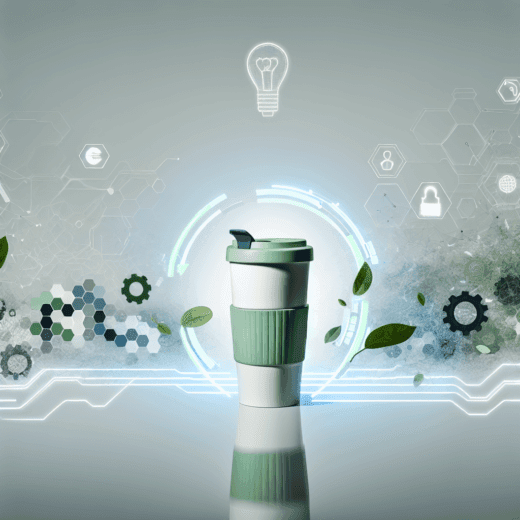Introduction: The Rise of Sustainable Coffee Cups
The world is witnessing a paradigm shift in the way products are consumed, with sustainability emerging as a critical focus across various sectors. Among these, the coffee industry stands out not just for its size but also for its environmental impact. Disposable coffee cups have become symbols of environmental neglect, given their significant contribution to global waste. Each year, billions of these cups are discarded, with most not being recyclable due to their polyethylene lining. This has driven a surge in demand for sustainable alternatives — a promising arena for entrepreneurs looking to manufacture and sell reusable or biodegradable coffee cups.
Innovation Potential in the Sustainable Coffee Cup Sector
The drive to reduce waste has opened avenues for innovation in the creation of eco-friendly coffee cups. Innovations range from material science breakthroughs that incorporate plant-based linings and fiber to technological advancements in manufacturing processes. Companies like BioPak and KeepCup have revolutionized the industry by introducing compostable and reusable cups, offering customers a tangible way to reduce their carbon footprint. Startups must prioritize product differentiation, focusing on unique materials or new technical approaches that provide a more sustainable lifecycle for each cup. Scientists and product developers are experimenting with using innovative materials like cornstarch-based polymers, hemp fibers, and even fungi, each offering unique environmental benefits.
Market Disruption and Opportunities
The transition from conventional to sustainable coffee cups represents a significant market disruption, propelled by consumer demand and regulatory mandates. Governments across continents are imposing bans and taxes on single-use plastics, creating a favorable regulatory landscape for sustainable cup businesses. As coffee chains and cafes increasingly adopt eco-friendly practices, the demand for sustainable cups is set for exponential growth. Startups delving into this space not only partake in reducing global waste but also have the opportunity to reimagine the coffee-drinking experience through design and functionality. Engaging with cafes, restaurants, and even retail giants like Starbucks or McDonald’s could expand market reach exponentially.
Challenges in Manufacturing and Selling Sustainable Cups
Despite its potential, the sustainable cup industry faces notable challenges. Production costs can be substantially higher due to the novel materials and technologies involved in manufacture. Securing a reliable supply chain for these materials poses another difficulty, especially when scaling operations. Additionally, convincing consumers to make the switch from familiar disposable options to unfamiliar alternatives requires strategic marketing efforts. Companies also must ensure proper end-of-life handling of their products to prevent compostable or biodegradable cups from languishing in landfills, negating their environmental benefits. Consumer education and infrastructure for composting are crucial for overcoming these hurdles.
Strategies for Success in the Startup Landscape
To achieve success, startups in this emerging niche must navigate a complex ecosystem of challenges and opportunities with well-crafted strategies. A critical first step is ensuring product-market fit by conducting rigorous market research to understand customer needs and preferences regarding sustainability, price, and functionality. This includes both quantitative data collection and qualitative feedback loops. Key strategies comprise:
-
Fundraising: Engaging with impact investors who prioritize sustainability and articulating a clear market need and growth potential can attract essential seed capital. Crafting a compelling story that aligns business goals with broader environmental objectives is crucial.
-
Scaling: Focus on establishing streamlined production processes that can maintain quality while decreasing unit costs as volumes increase. Partnerships with established supply chain operators can facilitate smoother transitions to larger-scale production.
-
Customer Acquisition: Using green certifications and eco-labeling can build trust and appeal to environmentally conscious consumers. Furthermore, collaborations with high-profile coffee shops can aid visibility and reputation building.
- Technology and Business Model Innovation: Leveraging technology, from digital platforms for distribution to advanced material processing, creates a competitive edge. Additionally, experimenting with business models like cup rental or deposit-return systems can enhance product value proposition.
Real-World Case Studies and Success Stories
Learning from successful pioneers in the field provides actionable insights. Ecoffee Cup, for instance, has successfully married aesthetics with sustainability, offering vibrant designs that appeal to a wide audience beyond coffee aficionados. Their adoption of bamboo fiber not only aligns with eco-friendly practices but also hooks consumers on the tactile and visual appeal of their products. Similarly, CupClub offers a unique service where they handle all the logistics of producing, distributing, and collecting reusable cups, effectively addressing the practical aspect of encouraging reuse.
Academic Insights and Industry Reports: Foundations for Sustainable Growth
Harnessing insights from academic research and industry reports can guide strategic decision-making. Papers published in journals like “Journal of Sustainable Business” emphasize the importance of understanding consumer behavior shifts towards sustainability. Studies suggest that transparency in the supply chain is critical for product acceptance, where consumers seek assurance that every step aligns with eco-friendly practices. Industry reports, such as those from the Ellen MacArthur Foundation, discuss the potential circular economy applications, suggesting that startups embrace cradle-to-cradle design principles to stand out in cluttered markets.
Conclusion: Redefining the Beverage Consumption Experience
The mission to manufacture and sell reusable or biodegradable coffee cups is more than a business endeavor; it is a step towards redefining how beverages are consumed in a sustainable world. As consumers become increasingly eco-conscious, their purchasing choices reflect broader lifestyle changes. For entrepreneurs in this space, the route entails a marriage of innovation, strategic partnership, and thoughtful consumer engagement. Moving beyond mere transactions, these businesses contribute significantly to societal shifts towards sustainability, ultimately ensuring a greener future for generations to come. As sustainable practices gain momentum, the opportunities within this sector look promising, capable of shaping the future of coffee consumption at both local and global levels.

